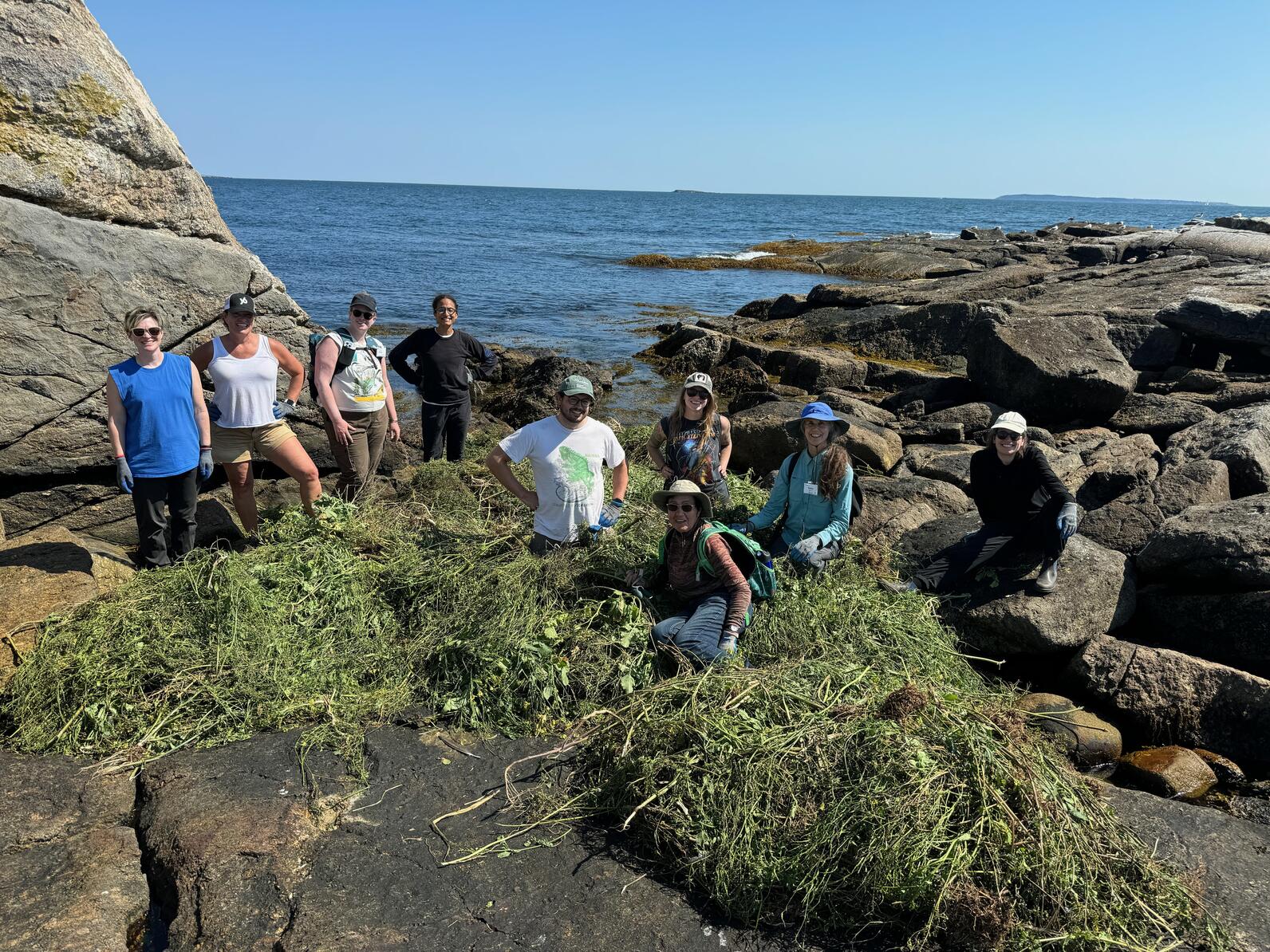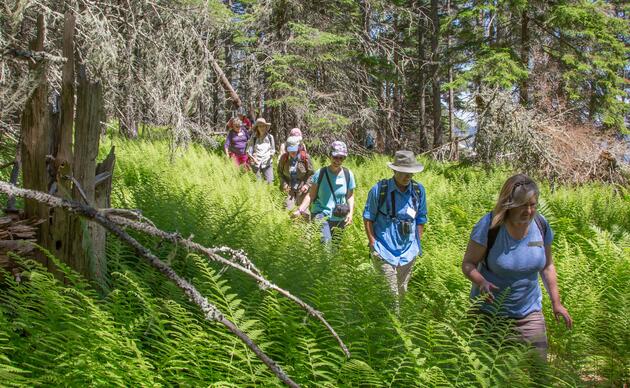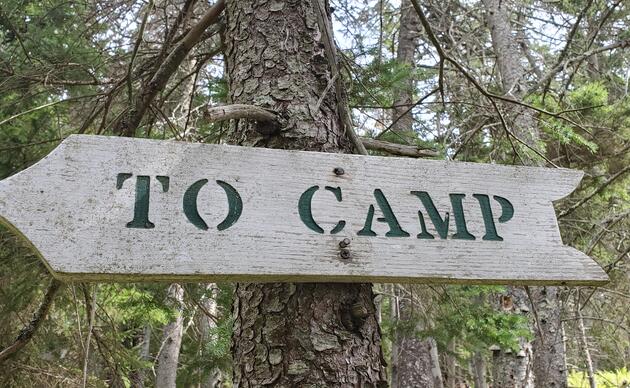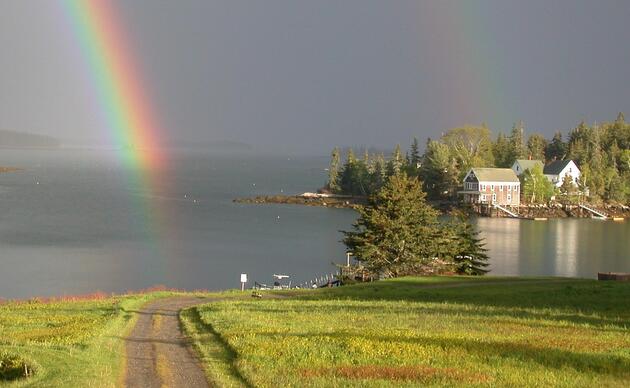Birds of Maine Islands
August 31 – September 5, 2025
Registration is open now for the 2025 Camp season! All campers must agree to the Camper Guidelines and Cancellation Policy. Please read this policy before registering.
REGISTER NOW
Scholarship Announcement!
We are very happy to announce that special camp scholarships are now available for this session. Anyone with a genuine financial need, interest in camp, and a willingness to act as a Hog Island 'Ambassador' is welcome to apply. These scholarships will be awarded on a rolling basis. The application will close one month prior to camp. Apply now!
Find answers to frequently asked questions about lodging, transportation, schedules, packing lists, meals, and more here. For technical support with CampDoc, please visit their help page or contact support@campdoc.com.
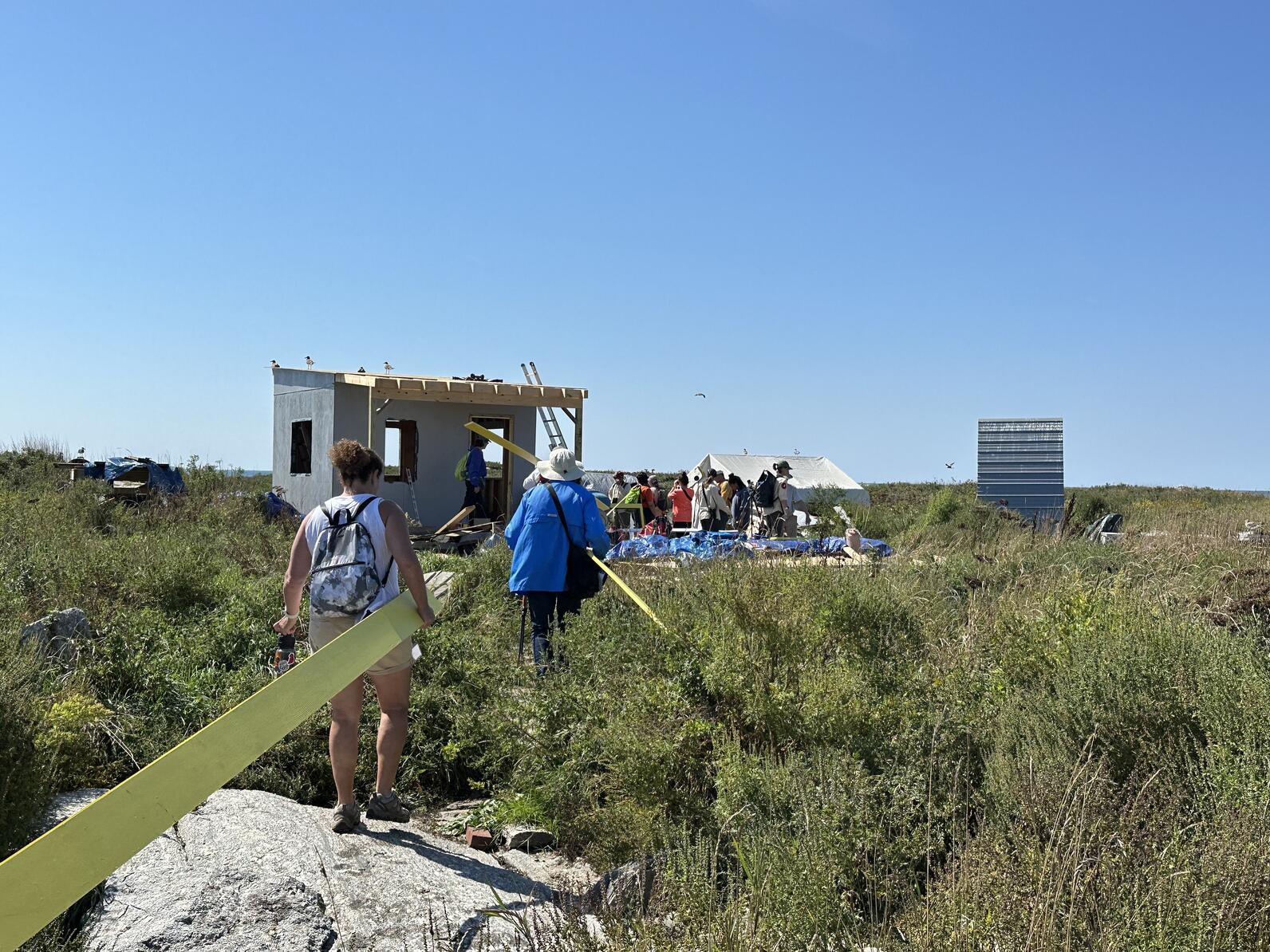
Learn what it's like to be a seabird biologist or "puffineer" in the place that seabird conservation first took flight! During this exciting hands-on week, seabird biologists and conservationists will guide campers through the biology, threats, and conservation of birds on Maine coastal islands. The central focus of this week is service. Campers will have the unique opportunity to directly support seabird research in Maine through various service projects throughout the week.
Through field trips, workshops, and evening programs, campers will learn about and contribute to conservation efforts. Field trips may include the opportunity to visit seabird islands where our Audubon researchers and nesting seabirds spend the summer. Workshops may include habitat management through invasive vegetation removal, marine debris cleanup, painting seabird decoys, and building blinds or chick shelters for researchers to use on the island colonies. Participants will learn from and work alongside preeminent bird biologists and leaders in the conservation field.
During this program you will learn about seabird identification, bird banding, adaptations, migration, and ecology while participating in active restoration work. Please note that the probability of seeing terns and puffins at this time of year is very low!
Pricing: $1425
The base registration fee includes meals, housing, instruction, and all field trips. This price is based on a standard shared room (with 2 twin beds) a shared bathroom. A limited number of upgraded accommodations are available for an additional cost. Two upgrade options are a single room for solo travelers or a room with a private bath for two people traveling together. There are no single rooms with private bathrooms available. Please see our lodging page for more information.
Participants must arrange their own transportation to and from the Audubon dock in Bremen at the start and end of the session. Please see our transportation page for more information.
There are several different scholarship opportunities available to help participants attend Hog Island sessions! Please see our scholarships page for more information about Hog Island Scholarships. You should also check with your local Audubon chapter or bird club for additional opportunities.
Requirements: There are no requirements to attend this program, but we do ask that you have a genuine interest in service work and seabird conservation. Carpentry, painting, and sewing skills are a plus!
Director
Maggie Dewane first visited Hog Island in 2002 as a camper for youth ecology camp and has since returned over the years as both camper and instructor, always drawn to this magical place. Now as an author and filmmaker, Maggie leads the Birds of Maine Islands session, sharing insight on climate impacts to wildlife and habitats. Maggie is the Communications Director to Defenders of Wildlife and serves on the board of Birdability, a nonprofit dedicated to increasing accessibility to the outdoors through birding. She co-hosts a wildlife podcast, The Watering Hole, and sits on the DC Environmental Film Festival Advisory Council. She has a B.S. in diplomacy and international relations from Seton Hall University and an MPA in environmental science and policy from Columbia University. In her free time, Maggie is hiking with her dog Argos, playing soccer, or eating the delicious food found on Hog Island.
Instructors
"Seabird Sue" Schubel is Project Puffin's own Disney Hero, and has been the Outreach Educator for Project Puffin since 2000. She loves to engage her students in exciting learning activities and share real data from the seabird islands with them. Her acquaintance with Project Puffin began in high school, when she saw Marlin Perkins rowing ashore with Steve on Mutual of Omaha's Wild Kingdom episode Return of the Puffin. She started working with Project Puffin as a volunteer on Matinicus Rock in 1984, and since then has spent many summers on islands in Maine,California and the Galapagos. Sue loves islands and beasts, and once acquired a dog with very familiar little black triangles over its eyes.
Katie Stoner is an Oregon State University PhD student assessing the conservation status and threats to Tufted and Horned Puffins breeding in the Kodiak Archipelago, Alaska. She developed a passion for wildlife while attending summer camps with Bird Alliance of Oregon (formerly Audubon Society of Portland) in her hometown of Portland, Oregon. After graduating from the University of Vermont, Katie studied avian ecology as part of several different research programs. She contributed to the conservation of threatened and endangered petrels and shearwaters in the tropical mountains of Kauai’s Na Pali Coast and monitored tree nests of the Marbled Murrelet in Oregon’s coastal forests. She lived in remote field camps in the backcountry of the Kodiak Archipelago, on Chowiet Island in the Gulf of Alaska, and on the windy slopes of Cape Crozier on Ross Island, Antarctica studying Adelie Penguins.
Keenan Yakola's coastal upbringing on Cape Cod, MA sparked a deep love for the ocean and New England coast. The earliest birding experiences he can recall from his childhood included watching Common Terns plunge dive for fish and Common Eider ducklings bravely tackling the waves crashing along Maine's rocky coastline. These experiences formed the foundation for his interest in birding and eventually the focus of his academic research.
Keenan has worked with the National Audubon Seabird Institute for over a decade. During this time he has worked as a research assistant on Eastern Egg Rock, served as the supervisor of Seal Island National Wildlife Refuge, completed his Master's degree focused on long-term dietary shifts in some of Maine's iconic seabirds, and now is pursuing his PhD studying the movement ecology of terns and petrels using GPS tracking devices here in Maine. While Keenan's research interests focus on the conservation of seabirds, he is passionate and curious about any bird he can put his binoculars on!
Junior Instructor
I'm Maddie Fernandez, I am an environmental science communicator, and I currently work at the Peggy Notebaert Nature Museum as a bilingual education specialist. I have a strong passion for community science, conservation and cultural work. I have been birding for some years now, and have been in Chicago's environmental education field for 6 years. I am originally from Mexico and am bilingual, which influences my birding. My favorite bird is a green heron (for now)! I am also really interested in alterative waste management and gardening :)
Guest Lecturers
Don Lyons is Director of Conservation Science for Audubon's Seabird Restoration Program. He has participated in seabird science and conservation for 20 years as a graduate student, post-doc, and Assistant Professor in the Department of Fisheries and Wildlife of Oregon State University. His interests include restoring seabird colonies using social attraction and understanding the relationship between seabirds and forage fish. His background as an electrical engineer and seabird biologist help him further research on tracking seabird foraging, dispersal, and migration using both banding and electronic tagging and assessing the impacts of changes in ocean climate on seabird breeding success and population resiliency.
In recent years, he has provided leadership for research and conservation about the critically endangered Chinese Crested Tern in Asia, investigations of the steep decline of Aleutian Terns in Alaska, and reduction of conflicts between Caspian Terns and threatened salmon populations in the Pacific Northwest.
Steve Kress is the Founder of Project Puffin, and was Executive Director of the Seabird Restoration Program and Vice President for Bird Conservation of the National Audubon Society for many years. He received his B. S. in Zoology and M.S. in Wildlife Management from Ohio State University, and his Ph.D. in Environmental Education from Cornell University. Steve began Project Puffin in 1973 and served as the Director from then until 2019, when he retired. Steve has also served as Manager of National Audubon's Maine Coastal Island Sanctuaries, Ornithology Instructor at the Audubon Camp in Maine on Hog Island from 1969 through 1981, and Director of the camp from 1982 through 1986 (as well as serving as Director once again just before his retirement). Prior to working for Audubon, he was Assistant Director of the Glen Helen Outdoor Education Center in Yellow Springs, OH, where he taught Field Ornithology and founded the Glen Helen Raptor Rehabilitation Center. Steve was formerly a Visiting Fellow for the Cornell Lab of Ornithology in Ithaca, NY, where he taught a popular birding course called Spring Field Ornithology for many years. Steve continues to teach a Spring Ornithology course, and it is now available via the Cayuga Bird Club.
NOTE: Audubon reserves the right to alter itineraries, instructors and particular arrangements, or to substitute similar itineraries or arrangements, at no penalty. If Audubon cancels a session, it will issue full refunds of all deposits or payments to the paid participants.
